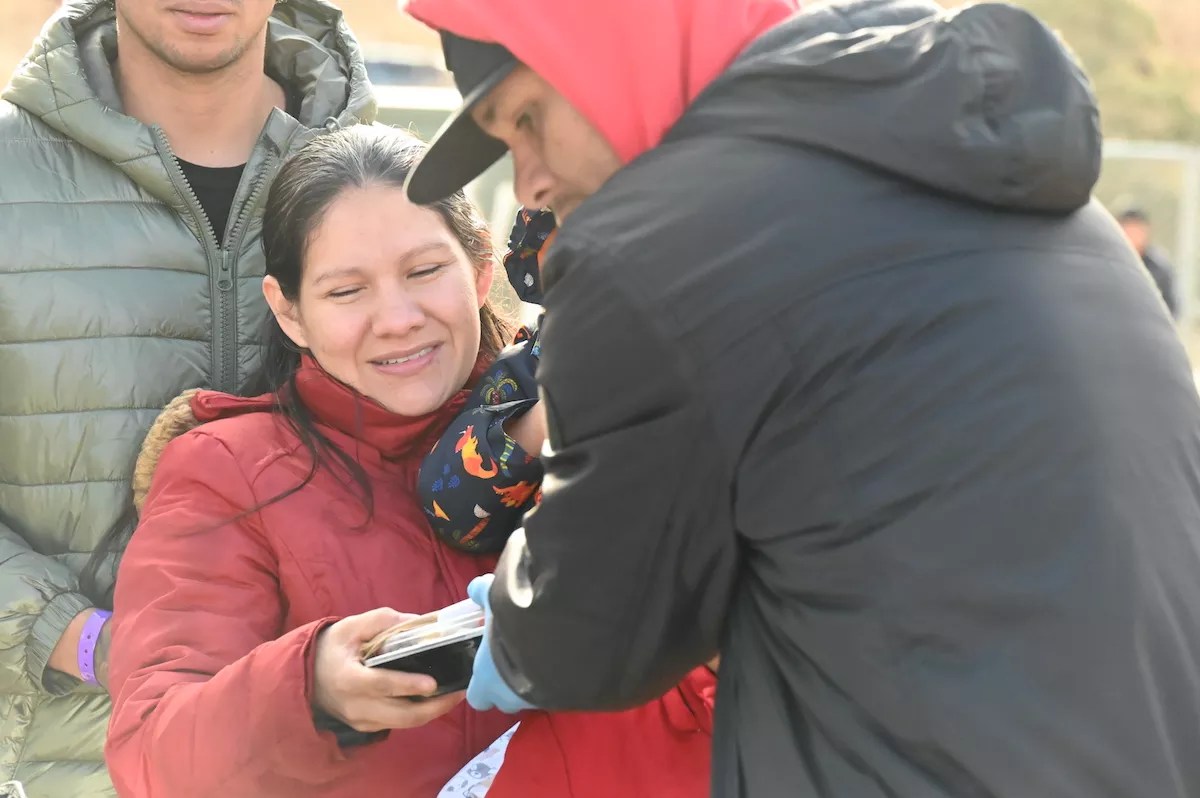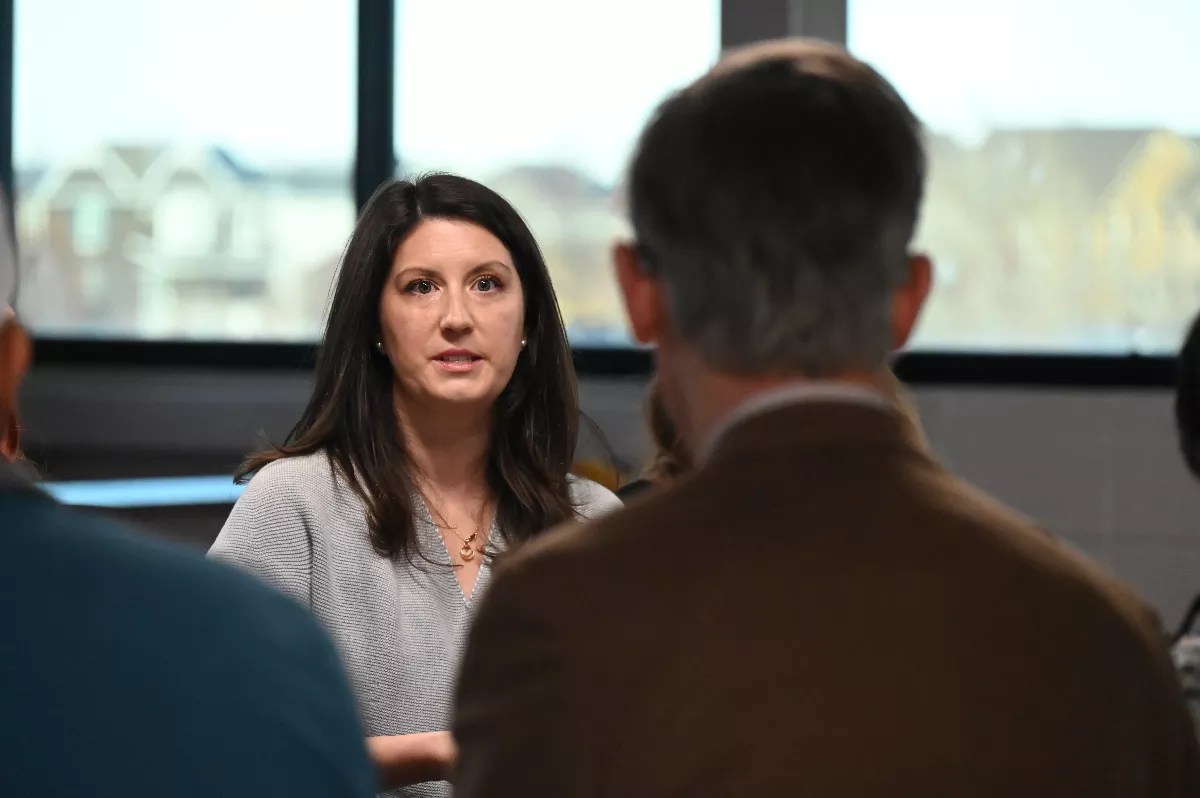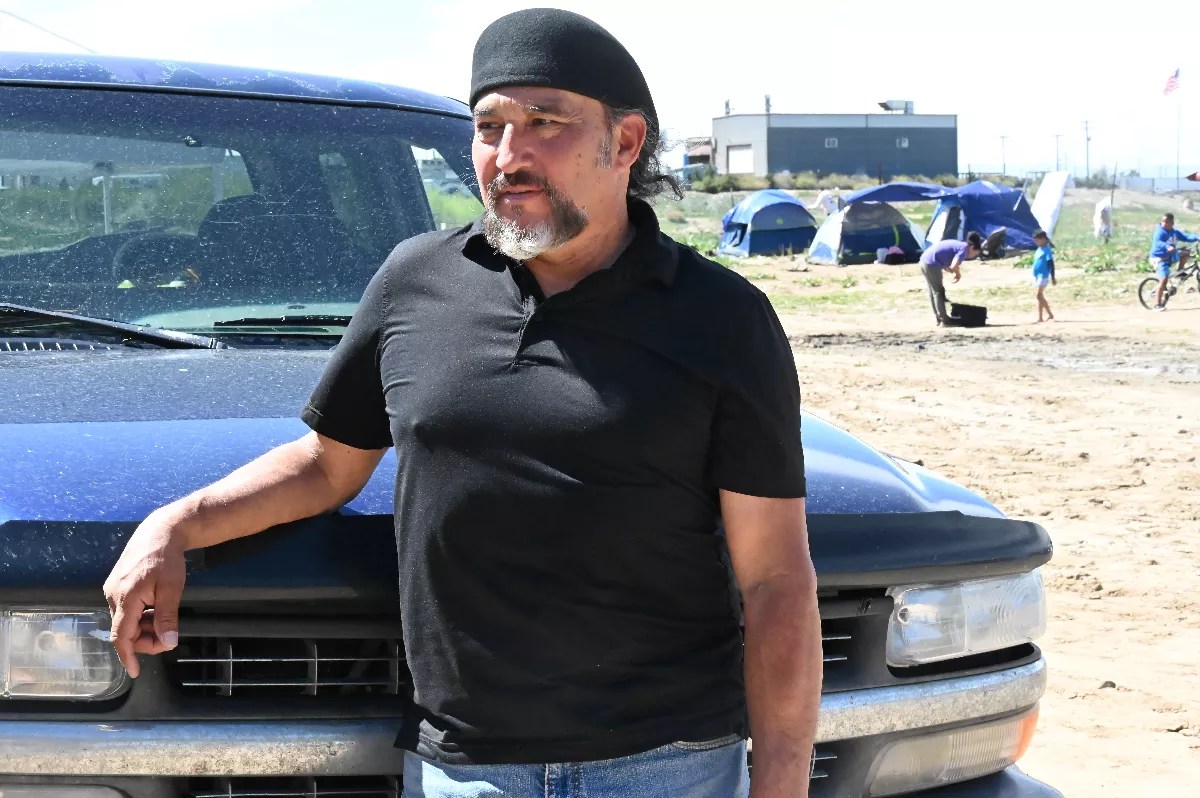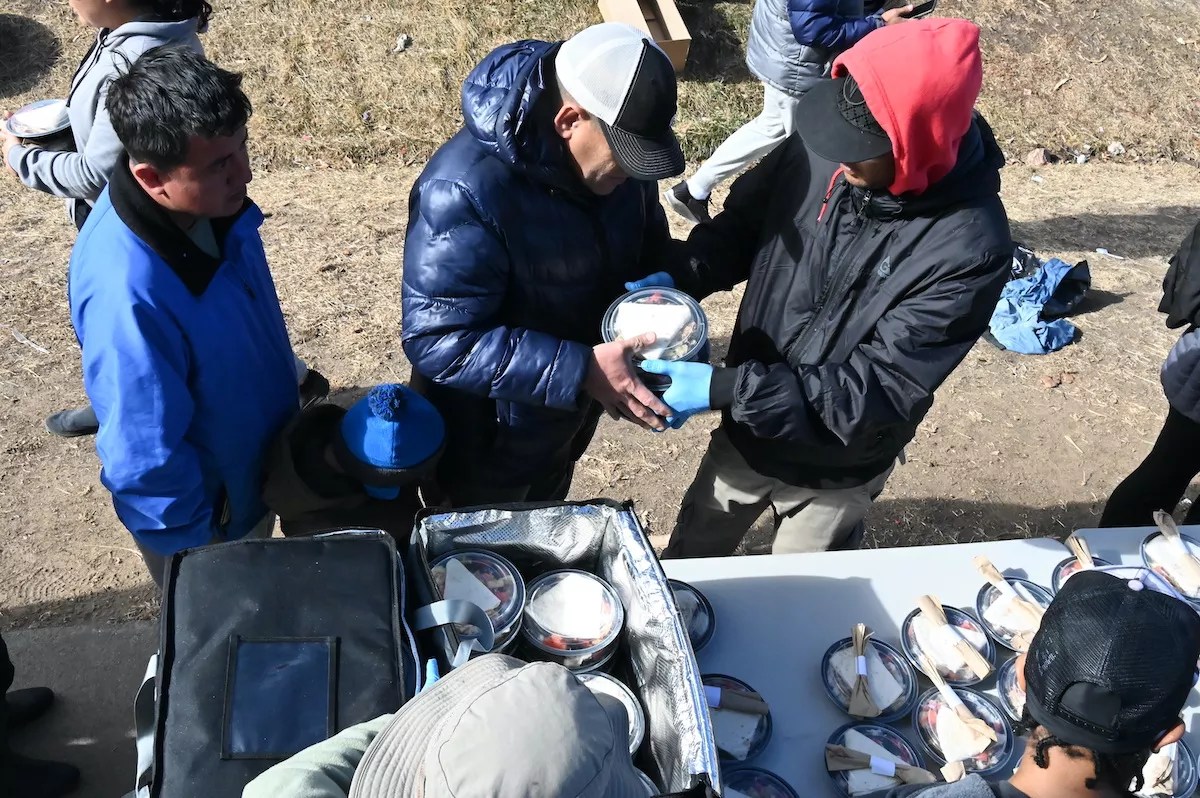
Bennito L. Kelty

Audio By Carbonatix
The Denver area has been home to a rapidly increasing number of migrants since 2022, with Sunday, December 15, marking two years since former mayor Michael Hancock declared a state of emergency.
About 43,000 migrants, mostly from Venezuela, have come to the city since that emergency declaration was made. However, Denver saw the largest influx in January, when more than 5,000 migrants were packed into city shelters during a cold-weather emergency. Mayor Mike Johnston’s office estimates that around 21,000 migrants are still in the metro area.
The Hancock administration initially responded to the crisis by setting up cots in city-owned rec centers and then renting rooms at hotels to convert into shelters for migrants. The Johnston administration continued using those hotels and rented out more. The second year started with more migrants packing city shelters than ever before, with the money spent on the shelters requiring cuts to Denver Parks & Recreation and Department of Motor Vehicles service hours. By the spring, the city had hired an immigration attorney to run a newly created newcomer program and began shifting from emergency mode to preparing migrants for a new life in Denver.
City officials relied on the help of nonprofits ViVe Wellness and Papagayo to teach migrant children English and get them enrolled in school; the groups also helped connect migrants to housing once they timed out of shelters and assisted them with applications for work permits.
Yoli Casas, the executive director of ViVe Wellness, estimates that about 30,000 migrant families, including 8,000 children, came to Denver during that span. She believes that around 18,000 migrants are still in the Denver metro area, with many moving on to Alamosa, Aurora, Colorado Springs, Greeley, Pueblo and mountain towns.
ViVe Wellness had about a dozen staff members in 2022 and early 2023, according to Casas. By 2024, the organization had 200 staff members helping migrants.
This summer, the number of migrant arrivals and the toll on city resources started to wind down. It shut down hotels used to shelter migrants in April this year. In early June, buses dropping off migrants stopped arriving in Denver, with zero reported since then, according to the mayor’s office. The city finally closed its last migrant hotel on June 30, though shelters remained open at a church, warehouse and the Mullen Home, a former assisted-living facility. That same day, officials also reported empty migrant shelters for the first time since the emergency declaration two years ago, but since July 1, the city has reported fewer than 26 migrants staying in its remaining shelters each night.
According to Casas, the last city-funded migrant family shelter left in Denver, the Mullen Home, closed this week.
A November report published from the Common Sense Institute estimated that since the emergency declaration in 2022, the total taxpayer cost of caring for migrants was $356 million in the city of Denver and at regional health care and education institutions. Although the organization identifies as nonpartisan, it has been labeled as conservative-leaning in the past.
More than $27 million was spent to convert hotels into migrant shelters, according to the mayor’s office, which disputes the figures shared by the Commons Sense Institute.
The crisis has taken a different shape in Aurora, where the migrant response was organized by nonprofits. The City of Aurora never declared an emergency like Denver, so there is no official tally of how many migrants have arrived or are currently living there.
Rather than welcome migrants, the Aurora City Council passed a resolution in February to commit itself to not funding a migrant response in the city. In August, the national spotlight shifted from Denver to Aurora after a property manager claimed that his apartment building was being taken over by a violent Venezuelan gang called Tren de Aragua. Some Aurora City Council members defended this claim, with at-large member Danielle Jurinsky making her case on Dr. Phil and Fox News.
Even though the Aurora Police Department denied that the Venezuelan gang had taken over, the attention drew Donald Trump to hold a rally in Aurora on October 11, where he laid out his plans for mass deportation and the death penalty for migrants who kill U.S. citizens. Soon after, Aurora City Council passed a resolution to investigate which nonprofits brought migrants into the city and how they were funded.
Casas says that ViVe Wellness never forced migrants to move into Aurora or neighboring jurisdictions, but if migrants wanted apartments there, the nonprofit would help set them up.
“Everybody has a right and freedom to choose where they wish to live,” Casas says. “We helped more families that reached out and said they were caught in the middle and wanted to move out of Aurora, not because of anything they did, but because of what the media was saying was going on in Aurora.”
Trump, now the president-elect, continues to promise mass deportations. On Sunday, December 8, he said in a Meet the Press interview that he would work on ending the constitutional right to citizenship by birth and start deporting immigrants on day one in office as part of Operation Aurora.
According to Casas, the second year of the Denver area’s migrant crisis was defined by local residents stepping up to help.
“That first year we were kind of on our own,” she says. “But in the second year, it was beautiful to have citizens come and help, to the point where everyday people would come by and say, ‘How can we help?’ This was, for us, a dream come true.”
Meet some of those everyday people who have helped migrants make Colorado a home.
Highlands Moms
During the first year of Denver’s migrant crisis, Andrea Ryall says, she was just a mom living in the Highland neighborhood.
“I had no idea what was going on,” Ryall says. “Two years ago, I was absolutely oblivious that there was a crisis, and I did not know anything about immigration or asylum or Venezuela, for that matter.”
More than 5 million Venezuelans have fled their country since 2019, when Nicolas Maduro won the presidency illegally, according to the U.S. State Department. His presidency has been marked by a continued manipulation of the country’s elections, extreme inflation and civilians being jailed without a trial or reason.
Ryall started getting up to speed on November 6 that year, when she took bananas to a Quality Inn in northwest Denver after seeing a post on Facebook that migrants were staying there. Expecting a well-organized event, she drove around with her kids in tow looking for a drop-off point, but instead she found children living in tents and without shoes during the winter.
“There were families and kids and just people fighting to have stability and a sense of normalcy, just working to feed themselves and desperate to know how to build a life here,” she remembers. “I assumed there were structures in place that would take care of this kind of issue, and I realized early in November last year that that structure doesn’t exist.”
After Ryall’s experience at the Quality Inn, she and other moms in northwest Denver started the Highlands Moms & Neighbors Facebook group to organize clothes drives for migrant children and pop-up businesses like barber shops for adults to make money using their skills from Venezuela.
“Immediate needs were what was needed in that moment,” Ryall says. “People needed water, and they needed food. They had not eaten. They needed boots and they needed coats. So we did that, and we did it well.”

Andrea Ryall, one of the leaders of the Highlands Moms, talked to U.S. Senator John Hickenlooper in February about how the federal government can help with the migrant crisis in Denver.
Bennito L. Kelty
During a blizzard in March, they helped migrants buy snow shovels to make a quick buck shoveling sidewalks and driveways and start their own businesses to get around lengthy work permit wait times. The group even reunited a family with the dog they had brought with them from Venezuela.
But by April, the Highlands Moms shifted from feeding and sheltering migrants to finding them work and permanent housing, which is what the group is currently focusing on with the help of a nonprofit the women helped start, Hope Has No Borders.
“It’s lots of apartment navigation, looking for rental assistance, really resourcing and answering questions,” Ryall says. “From big complicated questions, like someone who wants to return to their country. What’s the safest way to do that?”
On November 20, Johnston said in an interview with Denverite that if President-elect Donald Trump carries out his plans for mass deportation, known as Operation Aurora, in Denver, he’d have to deal not just with the Denver Police, but also with the Highlands Moms. “You don’t want to mess with them,” Johnston warned.
“He feels like he’s not alone because of us, and we feel like we’re not alone because of him,” Ryall says. “It’s really powerful and beautiful and speaks to the life we have here in this city and we intend to keep. I don’t think anyone, no matter who they voted for, wants to live in a society where government vehicles come into a city, knock on doors and take away people. That’s not American.”
Ryall says that a year ago she couldn’t imagine herself or the Highlands Moms taking on such a notable role.
“What we did, I think and hope that truly any American would do if there were an encampment full of kids in their neighborhood,” she says. “It has definitely changed my life, and I’ll never look at the world the same.”
My Mother’s Kitchen
Arthur Infante became a notable part of the citizen response to the migrant crisis when he began building hidden camps for migrants, equipped with kitchens, tents and even hand-dug irrigation systems and latrines.
Before getting involved with the migrant crisis, Infante worked with All Souls Denver, a nonprofit that gives food and supplies away to families and children, and regularly gave food and supplies to homeless residents out of the back of his pickup truck, an effort he called My Mother’s Kitchen.
In November 2023, a friend texted him to suggest serving food to migrants staying at the Western Motor Inn near Vasquez Boulevard and Interstate 70. Even though Infante was “nursing a hangover” that morning, he cooked up a stew and took it to the hotel, which the owners had turned into a shelter on their own because of its impending closure. Other volunteers were at the Western Motor Inn handing out food and supplies already, so Infante took his stew to the Quality Inn at Zuni Street. After that experience, he felt emotionally tied to the migrants.
“I said, ‘Hey, you know what, I’ll make an Indigenous stew and we’ll help these guys out, because I had been hearing about it, but I’ve kind of been on the sidelines. I haven’t really jumped in,'” Infante recalls. “From that time on…it was freezing, and these kids are standing there in socks. After that you’re like, ‘Oh, shit, well, you can’t say, well, I did my part and I’m done.’ You’re in it now.”

Arthur Infante, a Denver artist, built up and took care of migrant encampments during the second year of the crisis.
Bennito L. Kelty
Infante returned to cook for migrants in early January at a camp under Interstate 70 and Pecos Street. He built out a kitchen inside a tall tent, flanked by another tent to break the wind, and hung up a picture of his mom. It was his first inkling about building the infrastructure of a camp. He learned right away that Venezuelans don’t like spicy food and “are by far the pickiest people I’ve dealt with,” he says.
“They don’t like spicy food, and I’ve got hot sauce all over the place,” he says. “They won’t eat pinto beans at all. They just won’t. Black beans only.”
The Pecos Street encampment was crowded with volunteers, Infante says, so he moved his kitchen a few blocks away to West 48th Avenue and Fox Street and built his first migrant encampment around it. Even though it was swept in mid-January, only about a week after it opened, he formed a core group of about a dozen migrants who followed him to help build his next migrant encampment in March under the Central Park Boulevard overpass in Central Park.
The encampment hid under the nose of the City of Denver and Union Pacific, who owned the property, for more than a month before nearby residents reported it. Neary a hundred people were living there before the city swept it in early May. Most of its residents left to look for other places to camp before the city swept them, but the core group that hung around Infante moved to the Denver Community Church.
Infante stopped building encampments after that. He instead spent his time and money on food for the migrants staying at the church. By the end of his encampment projects, Infante had spent more than $8,000 feeding and sheltering migrants. Although a few hundred dollars came from donations, most of it came out of his own pocket, he says.
Now Infante finds himself helping out once a week by bringing food to the migrants staying at the Denver Community Church on Zuni Street, letting them take their fill of rice, tomatoes, beans, milk and other groceries. He also helps migrants move furniture about once or twice a month into their units as they transition from shelters to apartments.
These days, Infante says that he’s helping homeless residents more than he is migrants, but his thoughts often return to stories migrants would tell him during dinner about walking across Central America and Mexico through dangerous jungles and cities.
“They would risk their kids. How desperate do you have to be knowing your family might not make it? You’ve really got to be scared,” he says. “Listening to their stories, I thought, ‘Well, I would stay and figure something out,’ and they would say, ‘Well, that’s what we thought, that we would figure something else out, and we did that for a year.’ I learned a lot about myself helping them out, and I have more admiration that they’ve come this far.”
SAME Cafe
In late December 2023, a volunteer with All Souls Denver reached out to Carrie Shores, the executive director of SAME Cafe, for help with charitable work during the migrant crisis. SAME Cafe, whose name stands for So All May Eat, donates food or offers it in exchange for volunteer work. Before getting involved with migrants, the organization largely helped the city’s homeless population.
During the first year of the migrant crisis, “we definitely saw an increase in participants coming to the SAME Cafe to eat, and that was because of word of mouth,” Shores recalls. However, she says, the organization became more involved when All Souls reached out and said, “‘This is a bigger crisis, and we need more immediate food access.'”
Shores sat down with her team and worked out a schedule to start delivering 600 meals a week to migrants on Mondays, Wednesdays and Fridays. They organized meal trains at a migrant shelter in Montbello, modeling it off their experience serving meals to homeless residents during the COVID-19 pandemic. Before preparing any meals, however, they went to the shelter to ask the migrants what they wanted to eat.
“They said, ‘Rice, beans, meat, vegetables,'” Shores remembers. “And they told us, ‘Nothing spicy. Cheese is okay.'”

SAME Cafe fed migrants lunch every two days outside a shelter in Montbello for four months.
Bennito L. Kelty
“It started off with going to one shelter bringing 200 meals, and we quickly blew through them. Then we thought, ‘We’ll come back in two days, and then we’re going to come back in two days, and then we’re going to come back in two days,'” Shores says. “And then it grew to being a weekly thing through the end of April.”
The migrant hotel in Montbello closed in March, so the cafe shifted its meal train to the Quality Inn on Zuni Street. That hotel closed on June 30, but SAME saw the needs of migrants shift before that.
“The system finally caught up, and a lot of the families found employment, which is amazing,” Shores says. “We’ve definitely seen an increase in volunteer work in exchange for food over the last year and a half, and even more so in the last six months.”
From January to April, SAME Cafe served more than 8,000 meals and spent about $40,000, which it paid for with donations raised through callouts on Facebook. Right now, SAME Cafe’s meal trains are on hold, but it continues to donate food and toys to All Souls, Shores says.